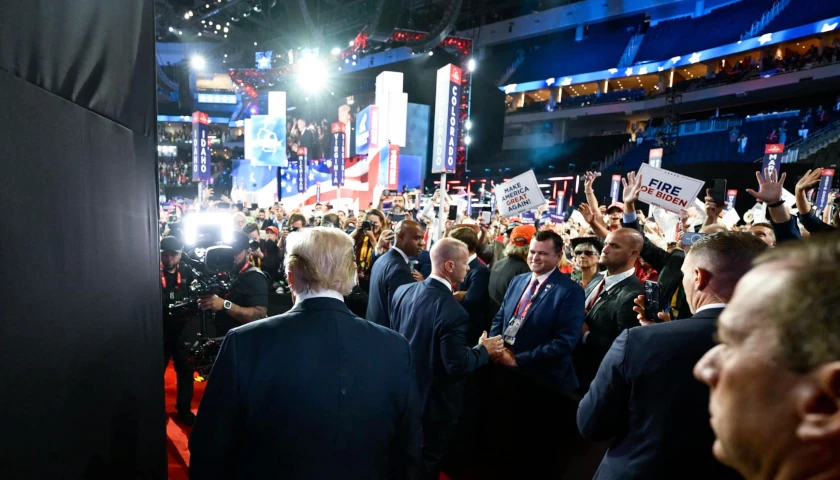by Thaddeus G. McCotter
The assassination attempt on former President Donald Trump has led his supporters and some, though not all, of his opponents to acquire a greater perspective on the most important things in life. It has also led his supporters to a broader recognition what is not necessarily important in the present campaign. This is a healthy development for the Republican Party and the Make America Great Again movement. Mr. Trump continues to lead and is, again, its presidential standard bearer. Yet, if not properly channeled, the ensuing enthusiasm can engender overconfidence among the campaign and its supporters.
The temptation to feel overconfident is all too human. For quite some time, Mr. Trump had been being persecuted as someone beneath the law by the left’s noxious lawfare cabal and was deemed a threat to democracy to be eliminated by Democrats and their mockingbird media. Following the assassination attempt on Mr. Trump’s life, his supporters and all decent people offered an outpouring of gratitude that his life had been spared. Having witnessed the twist of fate that allowed a turn of Mr. Trump’s head to save him and allow his life and candidacy to continue, two potentially contentious GOP political events possessed far less potential to ignite divisive intraparty arguments.
First, the Republican Party platform’s criticism became far more muted. Given the bitterness that lingered between supporters of the sundry primary challengers to Mr. Trump, devising a unifying policy document would be a challenge, and this challenge would necessarily be in addition to the traditionally divisive issues the platform has historically addressed, such as its pro-life plank. Yet, in the event, there came the realization that a party platform is not binding promise but an outline of potentialities. Further, a certain event in Butler, Pennsylvania, patently demonstrated how events can and do often overtake and render moot much of the platforms planks. Thus, one potential crisis was averted.
Second, given the assassination attempt as well as his age (though he is clearly hale and hardy), Mr. Trump’s choice of a running mate could potentially be even more contentious than normal, which, after all, it already was, for Mr. Trump was unceremoniously replacing his former running mate and vice president, Mike Pence. Nonetheless, with his canny, base-pleasing choice of Senator J.D. Vance (R-Ohio) as his running mate, another possibly divisive issue had been adroitly addressed.
With these two issues firmly in hand, a unified GOP Convention in Milwaukee nominated Mr. Trump and Sen. Vance and confidently embarked upon the general election campaign and the Democrat nominee. But are they doing so overconfidently?
After the initial prayers and gratitude for Mr. Trump’s surviving the assassination attempt, many of his supporters and friendly pundits began to believe the election was for all intents and purposes over. The electorate (well, those not suffering the hateful affliction of Trump Derangement Syndrome) would now view the former president as a sympathetic figure and, on top of his past policy successes and his successor’s failures, decide to vote for Mr. Trump. To assume so is a dire mistake.
First, the opposition has a vote. Actually, they have tens of millions of votes. And they have been hard at work in critical swing states, such as Michigan, Wisconsin, and Pennsylvania, to permanently implement their “emergency” extra-legal voting procedures into their constitutions and/or statutes. Consequently, every vote will be needed and every ballot collected and counted to defeat the well-oiled Democrat ballot harvesting operation and the private monies contracted with some Secretaries of State and local clerks for disproportionately driving out Democrat voter turnout, and this is in addition to President Biden’s executive order instructing his administration to abet the same voter turnout.
Secondly, America remains a politically divided country. To win the presidential election, there will be very few truly undecided voters to persuade to vote for Mr. Trump. While the events in Butler may help in pursuing these voters, as has been seen, one day is a lifetime in politics. One does not know what the future may hold. Indeed, one cannot even be certain President Biden will ultimately be his party’s nominee [as of time of writing]. Politically, then, one can never know what the next twist of fate may hold.
Even polling, which may presently appear favorable to the Trump campaign, can quickly change; moreover, the claims of the Trump campaign about them must be taken with a grain of salt: they are said to intimidate the opposition, not to inflate the overconfidence of his supporters. Conversely, the Democrats will make statements to instill fear in their partisans to make them work harder and to encourage overconfidence in Trump supporters to make them work less. Tune them out and focus on the task at hand. For today, while Mr. Trump is finding newly sympathetic ears, tomorrow those very same ears may prove fickle and heed another candidate’s pitch for their vote, likely for a presently unforeseeable reason.
In the end, then, it is best to remember the only things we can truly control are our actions and our efforts. Now is the time to focus, put our nose to the grindstone, and press on with the ground game that will get out the vote and return Mr. Trump to the presidency and Sen. Vance to the vice presidency; garner Congressional majorities in both chambers; and restore and expand GOP gains at the state and local levels.
– – –
An American Greatness contributor, the Hon. Thaddeus G. McCotter (M.C., Ret.) represented Michigan’s 11th Congressional district from 2003 to 2012 and served as Chair of the Republican House Policy Committee. Not a lobbyist, he is a frequent public speaker and moderator for public policy seminars, and a Monday co-host of the “John Batchelor Show” among sundry media appearances.
Photo “Donald Trump and Supporters” by Daniel Scavino Jr.




